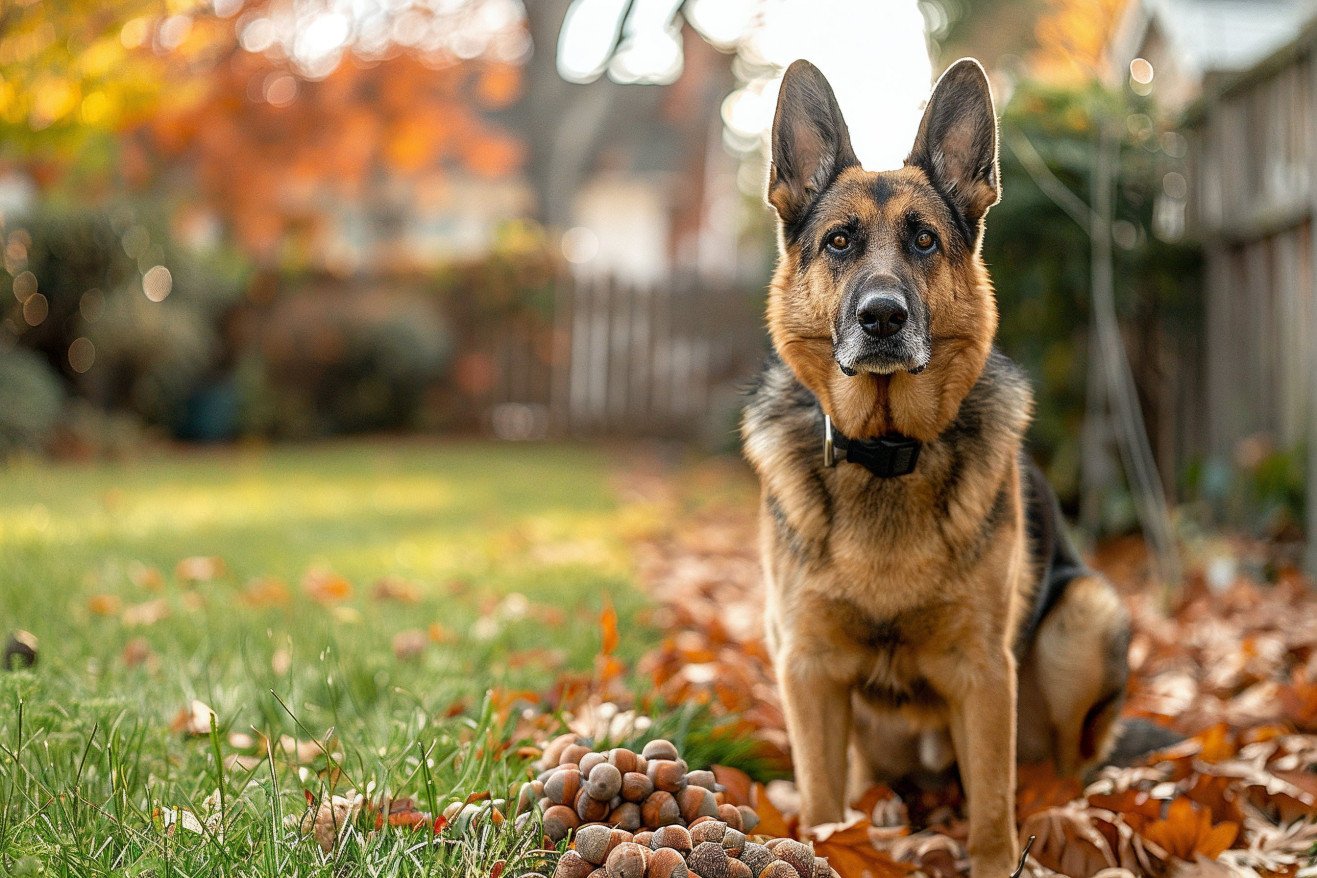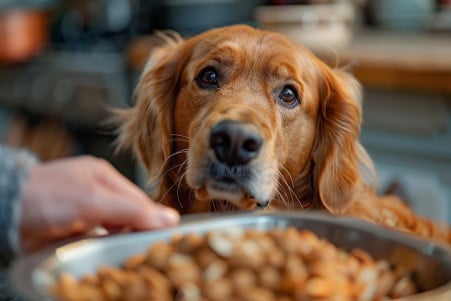Can Dogs Eat Acorns? A Detailed Guide to Acorn Toxicity
4 April 2024 • Updated 3 April 2024

If you’ve ever wondered whether or not acorns are safe for your dog to eat, you’re not alone. Acorns are a common sight in many people’s yards and local parks, and many pet parents have worried about the potential consequences of their dog eating them. While acorns aren’t poisonous to dogs, they can cause some gastrointestinal upset and even blockages if your dog eats too many due to their high tannin content and the fact that dogs can’t digest the shells and caps.
In this article, we’ll take a deep dive into the research conducted by veterinary professionals on the impact of acorns on dogs. By the end, you’ll know what to look out for and how to protect your dog when you’re out on your fall walks in acorn-rich areas. We’ll also cover how to recognize the signs of acorn toxicity and what to do if your dog eats too many acorns.
Are acorns poisonous to dogs?
Understanding the Dangers: Tannins and Acorn Toxicity
Tannins are a group of polyphenolic compounds that are present in acorns and are toxic to dogs, especially in large amounts. As 1800PetMeds explains, tannins are responsible for the bitter taste of acorns and can cause toxicity in high doses by binding to proteins and inhibiting their absorption. This can result in a protein deficiency and may cause kidney, liver, and gastrointestinal damage.
The amount of tannins in acorns depends on the species of oak tree and the ripeness of the acorn. One study cited by PMC found that acorns from red oak trees contain two to four times more tannins than those from white oaks. Meanwhile, as My Brown Newfies points out, green acorns with larger caps are less ripe and have higher tannin levels, which makes them more toxic to dogs.
While severe cases of acorn poisoning are rare, the study from PMC mentions several cases of dogs who experienced acute liver and kidney injury due to suspected acorn toxicity. It’s important to understand the dangers and take steps to protect your dog, especially during the fall when acorns are most prevalent. Knowing the potential signs of acorn poisoning can help ensure your dog doesn’t experience any serious health problems.
How to Tell If Your Dog Has Eaten Acorns
The symptoms of acorn poisoning in dogs can range from mild to severe. First Aid for Pets lists the following as mild symptoms: vomiting, diarrhea, lethargy, and loss of appetite. More severe symptoms can include dehydration, abdominal pain, and liver or kidney damage. In the most serious cases, Vet and Tech notes that respiratory paralysis and death can occur, but these are rare outcomes.
The size of the dog and the amount of acorns eaten can determine the severity of the symptoms, as Jollyes points out. Smaller dogs and puppies are more likely to have a more severe reaction. It's important to watch your dog closely for any signs of distress after you suspect they've eaten acorns, and if symptoms don't go away or get worse, it's important to take them to the vet.
What to Do If Your Dog Eats Acorns
If you think your dog has eaten acorns, Volhard Dog Nutrition advises that you call your vet immediately for advice from a professional. Watch your dog closely for symptoms like vomiting, diarrhea, or lethargy. Your vet may recommend inducing vomiting, fluid therapy, activated charcoal, or other treatments to help your dog get rid of the tannins.
If you suspect an obstruction or your dog is experiencing more severe symptoms, VMBS News warns that your dog may need to be hospitalized and given supportive care. It’s important to act quickly and get help from your vet to reduce the risks of acorn poisoning, according to The Farmer's Dog.
While acorn poisoning can be serious, some dogs and even breeds may be more likely to eat acorns than others. Knowing the risk factors can help dog owners prevent their pets from eating acorns.
Breed Susceptibility: Are Some Dogs More Likely to Eat Acorns?
While acorns can be a danger to any dog, Dogster explains that certain breeds or individual dogs may be more likely to eat them. Smaller breeds and puppies are more likely to have more severe symptoms because of their smaller size and lower weight. Napo Pet Care describes how smaller dogs have a lower tolerance to the toxins in acorns.
In addition, dogs with a high prey drive or those who are more likely to eat anything and everything may be more likely to eat acorns out of curiosity or boredom, as Whole Dog Journal explains. Dogs with these tendencies can be protected by ensuring they get enough exercise, mental stimulation, and supervision.
Still, Whole Dog Journal says that it's important to be careful and take steps to prevent acorn poisoning in all dogs, regardless of their size or breed. Acorns can be dangerous to any dog, so it's important to practice responsible pet ownership to protect your dog.
Prevention Strategies: How to Protect Your Dog From Acorns
The best way to prevent acorn-related problems is to prevent your dog from coming into contact with acorns in the first place. Blue Cross warns that acorns can be very dangerous if eaten, so it's important to always be aware of your surroundings when walking your dog.
One way to be proactive is to make sure that you're always cleaning up acorns in your yard, especially in the fall when they're most likely to be present. My Brown Newfies suggests using a lawn sweeper or light garden netting to catch acorns before they fall to the ground, which can help keep your dog away from the dangerous nuts.
You can also train your dog to respond to commands like 'leave it' or 'drop it' to prevent them from eating acorns while you're out on walks or during playtime. The Well-Trained Mind Community forum recommends making sure your dog gets enough mental stimulation and exercise to prevent them from eating acorns due to boredom or curiosity.
If you take these steps, you can make sure that your dog is much less likely to come into contact with and eat acorns. After all, your dog's safety is the most important thing.
Final Considerations: Understanding the Risks of Acorns for Dogs
Although acorns are not toxic to dogs, their high tannin content and potential for obstruction mean that they can pose a danger to your pet. According to the American Kennel Club, acorns contain compounds called tannins that are toxic to dogs, and eating them can result in severe gastrointestinal upset, kidney failure, and even death.
Vets-Now also warns that acorn poisoning, which is also known as Quercus poisoning, can result from eating oak leaves. Symptoms of acorn poisoning can include loss of appetite, vomiting, diarrhea, abdominal pain, dehydration, and shock. Veterinary care should be sought immediately, as waiting can result in irreversible damage.
BeChewy adds that while some dogs may eat acorns without experiencing any major problems, they can cause mild to moderate gastrointestinal upset in many cases, and in more severe cases, obstruction or irritation from the acorns themselves. Smaller dogs are especially at risk.
Taking steps to prevent acorn poisoning, such as removing acorns from your yard, training your dog, and making sure your dog gets enough exercise and mental stimulation, can help ensure that your dog stays safe and healthy.
By staying educated and being proactive, dog owners can help make sure that their pets don’t run into any issues with acorns during the fall.


